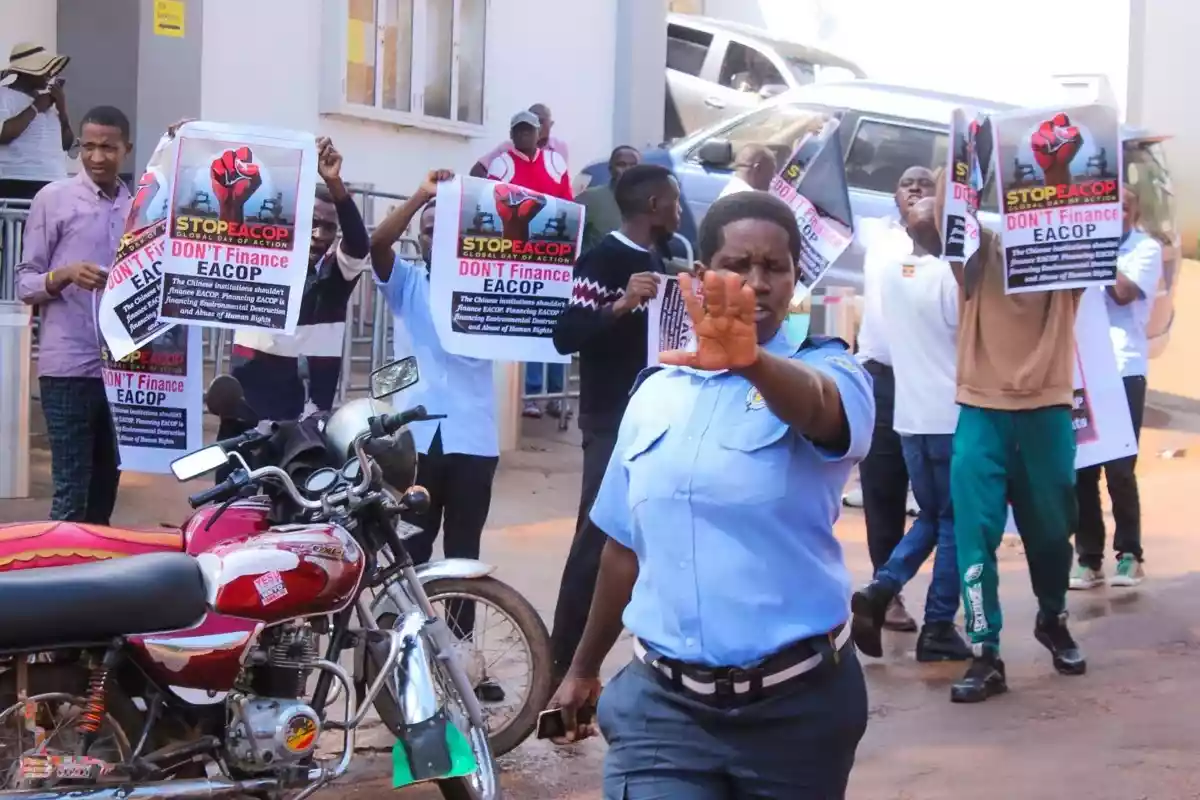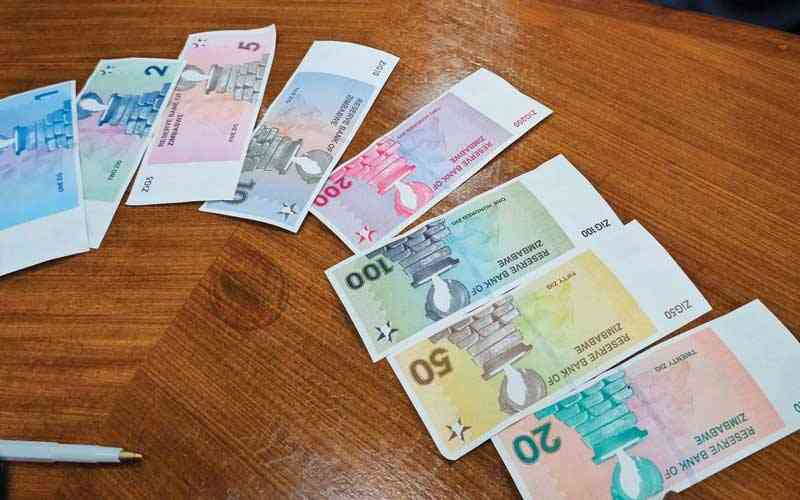
Environmentalists have stepped up a pressure campaign in East Africa amid reports that China is considering backing a major oil pipeline that runs from the Ugandan oilfields to Port Tanga in Tanzania.
Hundreds of environmental and community demonstrators staged coordinated multi-country protests at the corporate headquarters of various Chinese lenders on Monday, as well as Chinese embassies across Africa, Europe and North America, demanding the institutions to back out of the financing deal for the East African Crude Oil Pipeline (EACOP).
The protests were staged in Kampala in Uganda, Dar es Salaam in Tanzania, and Kinshasa in the Democratic Republic of the Congo (DRC), with solidarity demonstrations in South Africa, Paris, New York and London.
Activists want Chinese lenders – including state-owned China Export & Credit Insurance Corporation (Sinosure), Export-Import Bank of China (Eximbank), and Industrial and Commercial Bank of China (ICBC) – to drop their plans to bankroll the controversial US$5 billion project.
The development of the Ugandan oilfields and the pipeline threaten pristine ecosystems, biodiversity hotspots, water resources and community land, according to the activists behind the StopEACOP campaign.
The activists said China and Chinese firms should not be a “last resort” for a project with a devastating social and environmental impact on Africa.
At each location, the groups tried to deliver petitions calling for the end of the pipeline and the associated upstream oil projects in Uganda, Tanzania and the DRC.
But officials from the Chinese embassies in Uganda and South Africa refused to receive the documents, and seven activists were arrested in Kampala.
- Open letter to President Mnangagwa
- Feature: ‘It’s worse right now than under Mugabe’: Sikhala pays the price of opposition in solitary cell
- The brains behind Matavire’s immortalisation
- Masvingo turns down fire tender deal
Keep Reading
Other protests were held outside Sinosure offices in London and in Paris at the China Exim Bank and ICBC offices. Last Friday, a protest was held at the Chinese embassy in Washington.
The campaign focused on China after several international banks and insurers backed out over environmental opposition and the Chinese lenders were reported to be considering whether to step in.
According to StopEACOP, dozens of major banks including Barclays, Credit Suisse, Citi, HSBC, Deutsche Bank, Morgan Stanley and JP Morgan Chase have ruled out backing the pipeline. The campaign said AEGIS London, Arch Capital Group and Britam Holdings had decided not to insure the project.
South Africa’s Standard Bank and ICBC were acting as financial advisers and lead debt arrangers for EACOP, according to BankTrack, a tracking, campaigning and NGO support organisation. ICBC owns a 20 per cent stake in Standard Bank, South Africa’s largest lender.
Brian Atuheire, executive director of the African Initiative On Food Security And Environment, condemned the arrests of activists.
“Every time activists and communities stand up to peacefully oppose EACOP in Uganda, they are brutalised and arbitrarily arrested. Seven activists have been detained for peacefully protesting outside the Chinese embassy in Kampala. Despite the repression, we remain resolute and have drawn strength and courage from the incredible show of solidarity from comrades worldwide,” Atuheire said.
StopEACOP coordinator Zaki Mamdoo said the campaigners wanted Sinosure, Eximbank and ICBC “to listen to local communities and respect their rights, aspirations and agency”.
“By refusing to provide insurance or financing for EACOP, these entities must prove that they are not simply interested in profiting at the expense of Africa’s well-being.”
When completed, the 1,443km (896-mile) pipeline would transport crude oil from Uganda’s Lake Albert oilfields in northwest Uganda to Tanga on Tanzania’s Indian Ocean coast. The pipeline is expected to transport oil from two oilfields in western Uganda and may eventually connect to oil blocks in the DRC.
Chinese lenders have not officially announced that they will finance the project, but in September, Uganda’s Ministry of Energy and Mineral Development told the Post that Sinosure was working with Eximbank to provide more than half of the US$3 billion debt that Uganda needed to build the pipeline.
French oil multinational TotalEnergies controls a 62 per cent interest in the pipeline; the Uganda National Oil Company holds 15 per cent; Tanzania Petroleum Development Corporation has 15 per cent; leaving 8 per cent for Chinese oil giant China National Offshore Oil Corporation (CNOOC).
Last year, the issue found its way to the floor of the European Parliament, where legislators passed a resolution calling for a halt to the project over environmental and human rights concerns and warned TotalEnergies against backing the project.
The Chinese embassy in Uganda last year accused the European Union of trying to interfere with Uganda’s oil ambitions. China’s ambassador to Uganda Zhang Lizhong had said the EU “should not use the excuse of environmental and human rights issues to block development” of the oilfields and the pipeline.
Uganda has an estimated 6.5 billion barrels of crude oil – the equivalent of 1.4 billion barrels of recoverable oil.
CNOOC operates the Kingfisher oilfield, located on the eastern shores of Lake Albert in Uganda. It will invest an estimated US$2-3 billion to develop the oilfield, which would produce 40,000 barrels per day at peak production.
The other, larger oilfield is the Tilenga, operated by TotalEnergies, which is estimated to cost between US$4 billion and US$6 billion. It will produce 190,000 barrels per day.
Aly-Khan Satchu, a sub-Saharan Africa geoeconomic analyst, said the protests against the pipeline “look and feel very inorganic”, in reference to their foreign influence. Satchu said the Chinese lenders would view this as an opportunity for leverage to negotiate better returns since “the furore has repriced risk higher” and they would not be averse to diversifying the geographical exposure of their oil and gas supplies.
“I expect Chinese lenders to step up and support Uganda at this moment. So, from an economic and a geoeconomic perspective, this is a no-brainer for the Chinese,” Satchu said.
Brendon J Cannon, a specialist in geopolitics and international affairs, said the protests were unlikely to be the deciding factor in terms of financing the oil pipeline.
If the lenders were to back out, Cannon said it would be due to a combination of factors such as the relative slowing of the Chinese economy and higher lending costs since “the era of cheap money is over”.
Cannon said there were also Chinese sensitivities to consider about how they would be viewed by the wider Global South in terms of combating global warming or climate change in the run-up to COP28 in Dubai early next month. Another factor was the sunk costs versus perceived benefits of exporting Ugandan oil via Tanzania, he added.
He also said the options for financing the oil pipeline were increasingly limited.
“If China fails to finance Uganda’s quest for energy autonomy via ‘de-coupling’ from Kenya, it may go back to Kenya and try to get a pipeline built to export oil via Lamu or Mombasa,” Cannon said, in reference to the oil that Kenya discovered in its northwest more than a decade ago.







